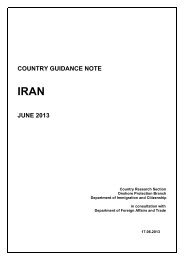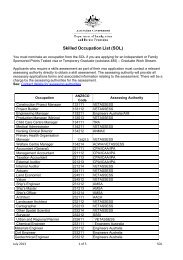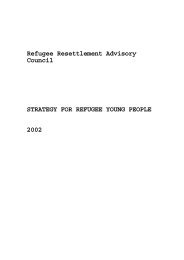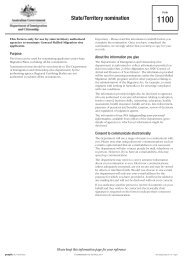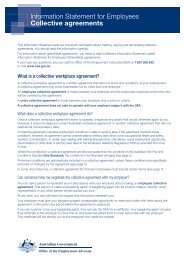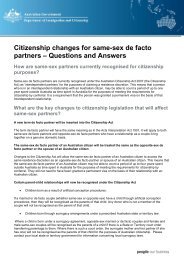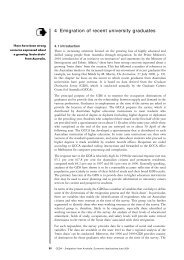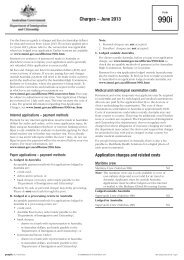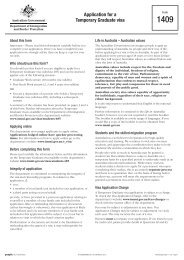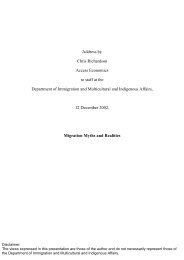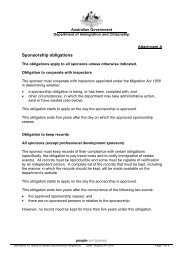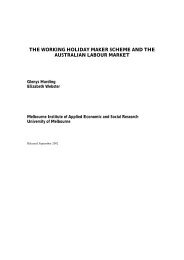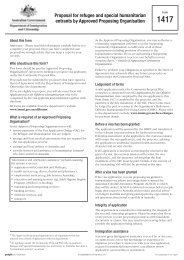Evaluation of the Integrated Humanitarian Settlement Strategy (IHSS)
Evaluation of the Integrated Humanitarian Settlement Strategy (IHSS)
Evaluation of the Integrated Humanitarian Settlement Strategy (IHSS)
Create successful ePaper yourself
Turn your PDF publications into a flip-book with our unique Google optimized e-Paper software.
Proposers do it [state <strong>the</strong>y can provide support] because that’s <strong>the</strong> only way to get <strong>the</strong>ir<br />
family out here.<br />
(PS provider)<br />
<br />
The overwhelming pressure to assist family members leads some proposers to propose more<br />
families than <strong>the</strong>y could reasonably support (serial proposers). As a result, <strong>the</strong> entrants in <strong>the</strong>se<br />
situations may receive inadequate support.<br />
Reluctance to acknowledge problems. The problems faced by proposers are also compounded<br />
by proposers’ reluctance to acknowledge that <strong>the</strong>y are having difficulties and seeking assistance.<br />
They may be afraid that this may affect <strong>the</strong> visa <strong>of</strong> <strong>the</strong>ir proposed entrant and <strong>the</strong>ir ability to act as<br />
a proposer again in <strong>the</strong> future.<br />
The difficulties which exist in ensuring that proposed entrants receive adequate support are <strong>of</strong>ten<br />
compounded for cases which are proposed by groups or organisations. Some community<br />
organisations receive great pressure from community members to sign proposals because <strong>of</strong> <strong>the</strong><br />
mistaken belief that such a proposal will have a greater likelihood <strong>of</strong> receiving a favourable decision.<br />
In some instances <strong>the</strong> individuals who originally requested that <strong>the</strong> community organisation propose<br />
<strong>the</strong> case on <strong>the</strong>ir behalf have been unable or unwilling to actually provide support once <strong>the</strong> entrants<br />
arrive onshore. This is fur<strong>the</strong>r complicated by <strong>the</strong> fact that some community groups have in <strong>the</strong> past<br />
not kept adequate records <strong>of</strong> proposed cases and as a result may not know which individual <strong>the</strong><br />
proposed entrant is linked to. Pressure on <strong>the</strong> community groups by <strong>the</strong>ir members may also result in<br />
<strong>the</strong> number <strong>of</strong> proposals exceeding <strong>the</strong> number which <strong>the</strong> group and community is able to support.<br />
Although it is apparent that <strong>the</strong>re is a large number <strong>of</strong> proposers who are not capable <strong>of</strong> providing<br />
settlement support, <strong>the</strong>re is no legislative requirement for such capacity to exist. An assessment <strong>of</strong><br />
<strong>the</strong> proposer’s capacity to provide support is conducted by overseas posts prior to referral (generally<br />
only on <strong>the</strong> basis <strong>of</strong> <strong>the</strong> information provided by <strong>the</strong> proposer on <strong>the</strong> proposal form). This assessment<br />
is only used, however, to recommend to <strong>the</strong> relevant DIMIA State/Territory <strong>of</strong>fice <strong>the</strong> level <strong>of</strong> services<br />
which <strong>the</strong> entrants receives. As mentioned above, one <strong>of</strong> <strong>the</strong> roles <strong>of</strong> <strong>the</strong> PS provider is to identify<br />
cases where <strong>the</strong> proposer is no longer able to directly support <strong>the</strong> entrant, and to refer <strong>the</strong>se cases to<br />
<strong>the</strong> DIMIA State/Territory <strong>of</strong>fice. In reality, however, many PS providers never meet <strong>the</strong> proposers<br />
face-to-face and rely on <strong>the</strong> proposers to self-identify that <strong>the</strong>y are unable to provide support.<br />
Even if an overseas post or PS provider recommends that an entrant receives additional <strong>IHSS</strong><br />
services, it may not be possible under current funding arrangements for <strong>the</strong>se additional services to<br />
be provided to all proposed families who need <strong>the</strong>m. This results in inequity in <strong>the</strong> standard <strong>of</strong><br />
settlement services which are provided to proposed cases, inequity which <strong>the</strong> <strong>IHSS</strong> was introduced to<br />
remove.<br />
Timing <strong>of</strong> service delivery<br />
Flights for SHP entrants are <strong>the</strong> responsibility <strong>of</strong> <strong>the</strong> proposer. Unless <strong>the</strong>se are arranged through<br />
IOM, DIMIA is not aware <strong>of</strong> any impending arrival <strong>of</strong> SHP entrants. It appears that PS service<br />
providers do not routinely seek this information from proposers. As a result it is difficult for PS<br />
providers to effectively time service delivery. If information is provided immediately after <strong>the</strong> case is<br />
referred, <strong>the</strong>n it may be forgotten by <strong>the</strong> time <strong>the</strong> entrants arrive. If, alternatively, <strong>the</strong> service is not<br />
provided at this time, <strong>the</strong>n it is possible that <strong>the</strong> entrants may arrive before <strong>the</strong> proposer is provided<br />
with <strong>the</strong> information necessary to assist <strong>the</strong>m.<br />
54<br />
<strong>Evaluation</strong> <strong>of</strong> <strong>the</strong> <strong>Integrated</strong> <strong>Humanitarian</strong> <strong>Settlement</strong> <strong>Strategy</strong> 27 May 2003



